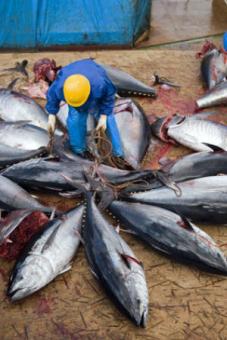Solutions to the grave problem of global overfishing
A couple of stories this week related to the desperate state of many of the world’s fisheries, many of which have been decimated by overfishing. A study by the Wildlife Conservation Society, ARC Centre for Excellence for Coral Reef Studies, and other groups on more than 40 coral reefs in the Indian and Pacific Oceans indicates that “co-management” — a collaborative arrangement between local communities, conservation groups, and governments — has been largely successful in sustaining fisheries and improving people’s livelihoods.

Blue fin tuna are just one species of fish whose numbers have fallen precipitously in recent years
“Globalized food chains can undermine local, democratic efforts to manage fisheries better. People often assume that local population size is the main driver of overfishing — but our research shows that access to global markets and seafood dependence are more important, and provide possible levers for action.”
You can read more about this promising study here.
In related news, experts in marine science have recommended halving global fishing for crucial prey species such as herring, anchovy, and other “forage fish” to account for their critical role as food for larger species.
A thriving marine ecosystem relies on plenty of forage fish. These small schooling fish are a crucial link in ocean food webs because they eat tiny plants and animals, called plankton, and are preyed upon by animals such as penguins, whales, seals, puffins, and dolphins. They are primary food sources for many commercially and recreationally valuable fish found around North America, such as salmon, tuna, striped bass, and cod.
Read more about the group’s recommendations here.
So cutting catches of prey species and co-managing local fisheries. Sounds like a good start to me. What would it take to make this a reality?